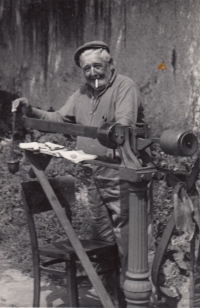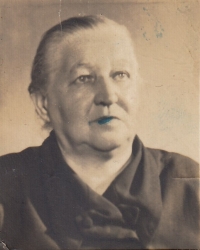Kamila Kouřilová
* 1936 †︎ 1936
-
“The Russians threw two bombs once. In our neighbourhood there was a junkyard with overgrowing trees. Two fighters arrived and the Russians thought there were Germans hidden because they had already fled with other people from the mountains. So they threw two bombs. I, my sister, the Ukrainian Vasil and his cousin, were carrying a large basket of hay, because we had pigs hidden behind the stream by my grandmother´s. Grandma said we should bring feeding and hay for horses. So we carried it, and as we arrived in my grandmother's garden, there were some boys hidden and they threw the two bombs down. Vasil and his cousin laid the basket and laid down behind the pine. As the bomb exploded, the shard bounced off the tree, and broke the spine of the cousin. We didn't see it because we were with my grandmother's sister. We saw someone being pulled on a blanket, but we didn't realize that something could have happened.”
-
“He did it by having half a pig under the grain. The Ukrainian was sitting in the wagon and his father went to the customs office and told him that as both the soldier lift the bolt, he should beat the horses and rush away. That he would run and scold that he was stupid, that he didn't understand. He told him he could ride fast enough to catch up. Because if they had caught him, they would shoot us all.”
-
Full recordings
-
Olomouc, 04.05.2018
(audio)
duration: 02:13:12
Full recordings are available only for logged users.
Kamila Kouřilová, her maiden name Mádrová, was born on 19 February 1936 in the village of Mrsklesy near Olomouc. In her hometown at that time lived mostly the residents of German nationality (85 %). Most of the Czechs then left the village in 1938, shortly after the so-called Munich Agreement, when Mrsklesy became part of Nazi Germany. Although the Mádrová family remained, they had to resist national oppression because of Czech nationality. The authorities closed the inn and sent the children to a German school. Father Josef Madr, a butcher by profession, smuggled meat across the nearby Protectorate borders, which he also supplied to the partisans. Yet he was detained after the war on suspicion of cooperation with the Nazis, but released shortly thereafter. Later, his father refused to join the newly formed single agricultural cooperative (JZD), and therefore at the age of fifty-five sent to the auxiliary technical battalions (PTP) for two years in 1950. The family was also threatened to move out, so under pressure the father became a member of the cooperative. The political burden also remained on the children, and they all had difficulty in enrolling to schools. Kamile was only allowed the turning apprenticeship field. In fact, from the end of elementary school to retirement in 1991 (42 years), she worked as a lathe operator in Moravia in the Moravské Údolí. In 2018 she lived in Moravské Údolí.


